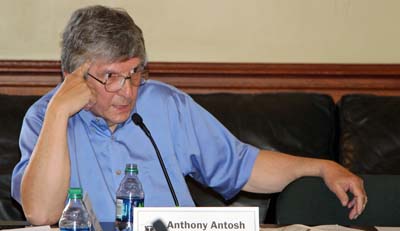By Gina Macris
John J. McConnell, Jr., the U.S. District Court judge overseeing changes in Rhode Island’s developmental disability service system, has signaled that that future funding of the social services is very much on his mind.
During a hearing Nov. 30 in Providence, McConnell listened to the state’s summary of the latest progress and the work still to be done to achieve the goals necessary to transform Rhode Island’s segregated services for persons with developmental disabilities into an integrated, community-based model. The transformation would bring Rhode Island into compliance with the U.S. Supreme Court Olmstead decision clarifying the integration mandate of the Americans With Disabilities Act.
After Kerri Zanchi, the state Director of Developmental Disabilities, had finished her prepared remarks, McConnell interjected the observation that the necessary services are all “contingent on funding.”
“Funding is a key issue,” both at the state and federal level, he said.
Zanchi, too, expressed concerns, saying the developmental disability community needs advocacy to make its case on budget issues.
Most recently in Washington, disability rights advocates have said that the proposed tax cuts now before Congress would result in reductions in spending through Medicaid, the federal-state program that pays for services required by a 2013 interim agreement and a broader 2014 consent decree between the state of Rhode Island and the U.S. Department of Justice.
In addition, the federal government’s re-direction of some vocational rehabilitation funding from Rhode Island to Texas has triggered a waiting list, effective Dec. 1, for future clients of Rhode Island’s Office of Rehabilitation Services (ORS), which is involved in implementing both the 2013 and 2014 agreements.
No one currently served by ORS will be affected, but by the time the court is scheduled to reconvene in April, the waiting list could include applicants for services who are covered by the consent decree or the interim agreement.
Meanwhile, Rhode Island’s implementation of the agreements has contributed to a projected cost overrun of almost $26 million in federal and state Medicaid funds for developmental disability services in the current fiscal year, and the Department of Behavioral Healthcare, Developmental Disabilities and Hospitals (BHDDH) is under pressure to find ways to cut costs.
McConnell said he hoped that state officials will take into consideration the requirements of the 2014 consent decree (and the more limited interim agreement) as they look for cuts in social services in the coming months.
He said he wanted it known that “the third equal branch of government is watching.”
State Details Compliance Efforts
The Nov. 30 hearing concerned those who are covered by the so-called “Interim Settlement Agreement,” originally 125 former students at the Birch Academy at Mount Pleasant High School in Providence who at one time were funneled into jobs paying sub-minimum wage at the former sheltered workshop, Training Through Placement (TTP) in North Providence.
The latest update puts the current number in this group at 91 individuals whose cases are still open at the state Division of Developmental Disabilities (DDD), said Zanchi, the division director.
She summarized the state’s progress in working with them:
- 51 have jobs in the community paying at least minimum wage
- 21 are unemployed but job-hunting, with support
- 7 are currently inactive
- 12 have chosen not to work but are receiving integrated day services from a total of 12 providers.
In a report to the court submitted the eve of the hearing, an independent monitor, Charles Moseley, framed the employment statistics differently.
He zeroed in on an order from McConnell in June that the state follow up on 46 unemployed members of the class protected by the interim agreement of 2013, including 34 who had never had a job in the community.
Among the group of 46, Moseley said the state had made 11 job placements as of the end of October. That is most of the goal of 15 placements that must be made by March 23, 2018. An additional 16 placements must be made by June 23, 2018, and target dates for the remaining 15 placements are to be determined, he said. (Some of them have indicated they don't want to work.)
'Underperformance' Of One Provider Hurt State
Much of the testimony, as well as Moseley’s comprehensive report, concerned Community Work Services, the successor to TTP, the sheltered workshop at the center of the U.S. Department of Justice investigation that led to the interim agreement of 2013.
CWS serves 57 of the 91 individuals covered by the interim agreement, according to Zanchi. (CWS’ own report to the monitor earlier in November put that figure at 59, with 5 of the 59 transitioning to other providers.)
Of the CWS clients covered by the interim agreement, 25 belong to the group of 46 unemployed individuals the judge said needed special attention, according to Moseley’s report. The rest are served by other providers.
Zanchi said the “underperformance” of CWS “has directly contributed” to the state’s non-compliance with the interim agreement’s targets for employment and integrated non-work services. CWS is a subsidiary of Fedcap Rehabilitation Services of New York.
By now, the state was to have found jobs for all members of the former Birch and TTP group who made an informed choice to seek employment.
Zanchi said the current CWS leadership has shown a “solid grasp of the significant change needed in their organizational structure” as well as the fact that it needs to reach performance goals “expeditiously.”
She emphasized that CWS’ “re-engagement of families” to support integrated services “cannot be understated.”
She shared the story of one young CWS client and the client's parents, who in a two-year span, had gradually shifted from adamant opposition toward warm embrace of the idea of employment. The client ow volunteers at the Rhode Island Community Food Bank and a local food pantry and meets with a job developer each week to explore part-time job opportunities, Zanchi said.
CWS Nearly Lost License
In May, CWS had come under fire – and was close to losing its license to operate in Rhode Island – for substandard programming, according to Moseley.
Since then, there has been a nearly complete turnover of staff and management at CWS, which has drawn up a new blueprint for change in keeping with principles of “person-centered planning,” putting the individual’s needs and preferences at the center of customized plans for immediate services and long-term goals.
CWS also has begun a pilot program called “Employment Without Walls” with 7 clients who are hunting for jobs.
The CWS plan was included in a 59-page report to the court from Moseley. Also included in Moseley's report was an evaluation from William Ashe, a Vermont-based consultant, who worked with Moseley in conducting a three-day, on-site review of CWS in early October.
Ashe, who had first evaluated CWS in October, 2015, said that “CWS is very different from the organization that was visited some two years ago.”
At the same time, Ashe said that “It was my hope that more gains would have been made over these 24 months than has been the case, particularly in the degree of sophistication of the person-centered planning process.” He noted that CWS, led by program director Lori Norris, “appears committed to restructuring the services and supports that it provides to comply with the ISA (Interim Settlement Agreement of 2013) and state regulations.“
In an interview, Ashe said, Norris also touched on financial challenges, which plague all service providers in Rhode Island as they struggle to help BHDDH meet the requirements of the federal mandates and still remain solvent.
According to Ashe’s report, Norris said “her superiors at FedCap are committed to success and will assure the proper level of staffing support even if this resource level is greater than what the current billing authorizations will support.”
CWS’ probationary license ends Dec. 31 and BHDDH must decide whether the agency will continue operating in Rhode Island.
The Massachusetts operations of CWS, a Boston-based agency, are now headed by Craig Stenning, Rhode Island’s former BHDDH director, who is also listed as Fedcap’s Senior Vice President for the New England region on the Fedcap website.
In his report, Ashe said Norris “was candid in her comments” during the October interview, “stating that the CWS program status at the time of her appointment (six months earlier) was very inadequate across most areas of performance.
“She described her efforts over this past six-month period to change the culture of CWS,” a drive that included a large turnover of staff.
CWS Tries Turnaround
After visiting KFI, a model program for integrated services in Maine, Norris told Ashe, she took several steps at CWS.
Norris, according to Ashe’s report, has:
- Stopped renovations at the former TTP building, instead planning to abandon any reliance on a facility for integrated services as of Jan. 1. (The former TTP building had been ordered closed to clients by the state in March, 2017 because of unsafe conditions. CWS’ license was suspended for a few days until it found a substitute location in quarters owned by the Fogarty Center.)
- Discontinued the use of vans to transport clients, instead opting to arrange for staff members to use their own cars on the job.
- Changed the job title of direct support staff to community advocate, saying she believes “this title better reflects the culture change she wishes to establish and more accurately conforms to the expectation for how she wants staff to approach their work.”
- Adopted a flexible work schedule for staff, so that they are available evenings and weekends to support clients who work outside normal business hours.
Problems Extend Beyond CWS
Moseley, the monitor, noted in his report that the non-work services received by CWS clients do not meet the requirements of the interim agreement or the statewide consent decree for integrated activities.
These activities are intended to “provide individuals with disabilities with opportunities to fully engage with people without disabilities in the mainstream” of social life as well as work, he said.
Practical and effective strategies for achieving these goals are not clear, not only at CWS but across the developmental disability service system, Moseley said.
To address the problem, the state Division of Developmental Disabilities (DDD) has articulated guiding principles and standards for integrated day services. Through the Sherlock Center at Rhode Island College, DDD also offers training in implementing successful strategies for integration, Moseley said, but he recommended the training be expanded.
Another, related problem is a mismatch between existing services for individuals and their long-range plans.
In a court-ordered review of individual records documenting current services and future plans, DDD found that in 58 percent of the cases, individuals’ ongoing activities didn’t necessarily help them achieve their goals, Zanchi told the judge.
As a result, DDD has taken steps to merge short-range and long-range planning into one streamlined and holistic process that encourages providers to think in terms of individualized services that can help develop skills and interests that will help a particular person realize long-term aspirations.
In addition, Zanchi said, DDD has developed a separate written guide, or rubric, for reviewing the quality of these individualized plans.
Zanchi Praises 'Collective Vision'
Zanchi concluded that she is “confident that there continues to be many areas where progress is clear,” recognizing that “quality is still developing” in services available to adults with developmental disabilities.
Zanchi said the progress is the direct result of a “collective vision that is guiding the work and transforming services.”
“We are building a remarkable partnership with the true experts of the DD system,” she said, referring to consumers, families, providers, business partners, community advocates as well as DD and ORS staffers.
They are all “invested in this progress and are at our table to strengthen our system to achieve these outcomes,” Zanchi said.
Click here to read the monitor's report.











